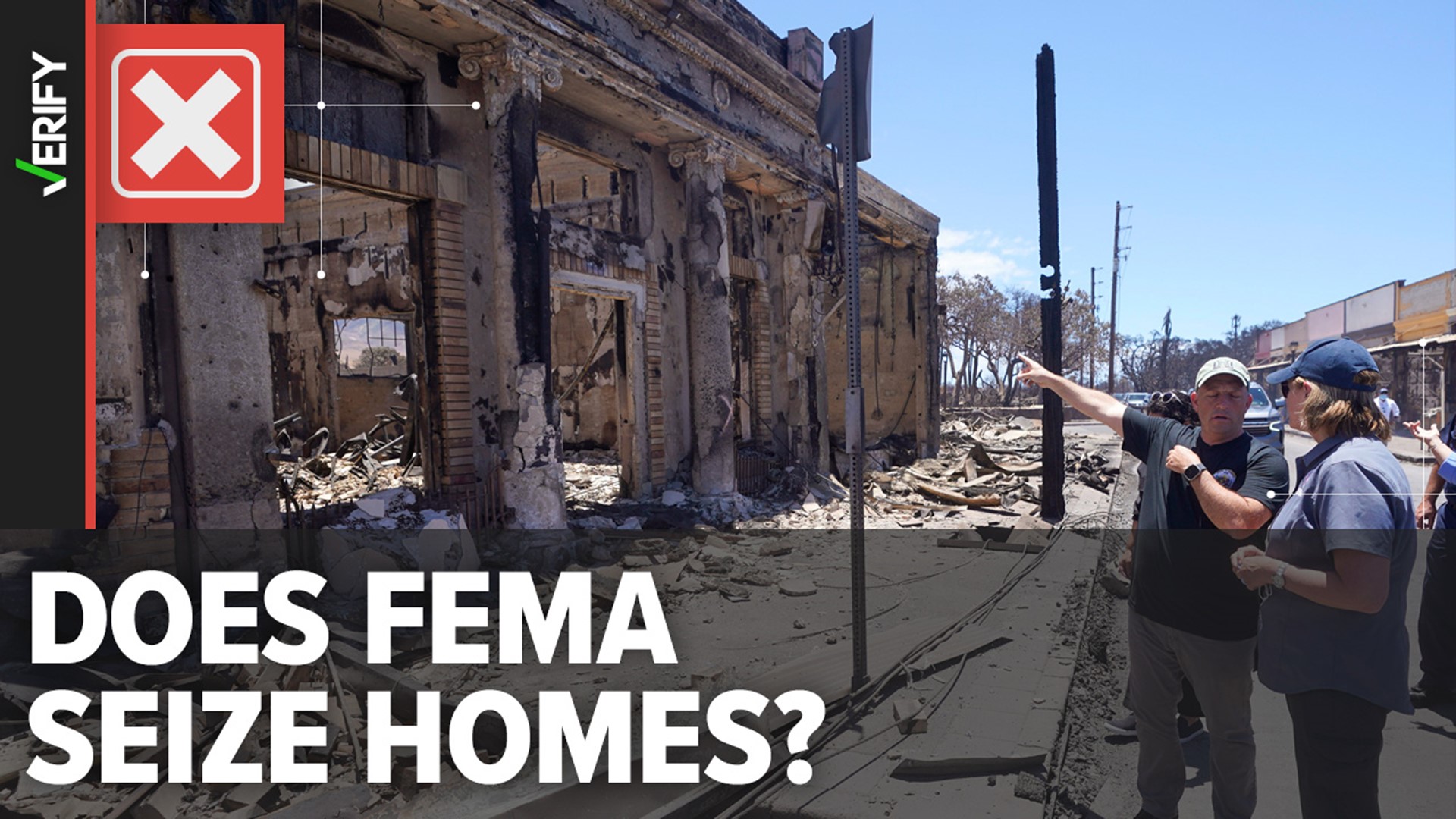The devastating wildfires on the island of Maui in Hawaii killed at least 97 people and destroyed almost the entire town of Lahaina, as well as properties in other towns and areas of the island. The federal government declared the wildfires a disaster Aug. 10, allowing impacted people to receive disaster assistance from the Federal Emergency Management Agency (FEMA).
People across social media networks are spreading a rumor that FEMA is granted authority by the Stafford Act to seize private property. Some have said that FEMA is making people give up their property in order to receive disaster assistance, or will force people to sell their land off to private developers by declaring their home uninhabitable. The rumors warn people affected by the Maui wildfires to not sign any papers from FEMA because of this.
THE QUESTION
Will FEMA seize your property if you accept disaster assistance?
THE SOURCES
- Federal Emergency Management Agency (FEMA)
- Stafford Act
- Dawson & Sodd, PLLC, a Texas-based law firm that specializes in defending private property owners in eminent domain cases
- Owners’ Counsel of America, a network of eminent domain attorneys dedicated to defending private property owners’ rights
- Hawaiian Governor Josh Green
THE ANSWER
No, FEMA will not seize your property if you accept disaster assistance.
WHAT WE FOUND
The Federal Emergency Management Agency (FEMA) says that FEMA won’t seize your property or house when you apply for assistance. This isn’t just an agency policy; the Stafford Act does not give FEMA the authority to seize property in exchange for disaster assistance.
“FEMA cannot seize your property or land,” a FEMA rumor response page says. “Applying for disaster assistance does not grant FEMA or the federal government authority or ownership of your property or land.”
FEMA may send an inspector to verify the damage to your home when you apply for disaster assistance, FEMA says. If this inspector deems your home uninhabitable, “that information is only used to determine the amount of FEMA assistance you may receive to make your home safe, sanitary and functional.”
This is not the first time FEMA has addressed this rumor. A Sept. 2021 FEMA fact sheet says the agency may provide assistance to replace or relocate your home, “but by law the agency cannot condemn a property.” FEMA contractors do not condemn properties as a result of their home inspections, the fact sheet says. Governments and private entities legally acquire property through condemnation.
One of the posts claiming FEMA can seize property under the Stafford Act refers to a screenshot of an article by Texas-based law firm Dawson & Sodd, PLLC. That article does say the Stafford Act gives FEMA eminent domain authority for emergency preparedness, which is the authority to seize private property for public use. But the article also says that FEMA can’t keep this land.
The Stafford Act says FEMA “may procure by condemnation… materials and facilities for emergency preparedness, with the right to take immediate possession thereof.” But the Stafford Act then says FEMA “shall not acquire fee title to property unless specifically authorized by law.”
In other words, FEMA may temporarily use private property to prepare for or respond to emergencies, but it must give the property back afterwards.
Another part of the Stafford Act says FEMA can provide funding to local and state governments to buy private property in areas affected by or susceptible to flooding. But in order to buy the property, the local or state government “must dedicate and forever maintain acquired property as open space” and “must acquire properties only from property owners who voluntarily agree to sell their properties” in order to receive FEMA’s funding, a FEMA property acquisition handbook says.
While the same section of the Stafford Act does give FEMA the authority to fund “hazard mitigation measures” in areas affected by fires, property acquisition as a mitigation measure only applies to places susceptible to flood. And even in those areas, FEMA can’t acquire the property itself, the property owner can’t be forced to sell and the property must never be handed over to private citizens or entities.
The Owners’ Counsel of America, a network of eminent domain attorneys dedicated to defending private property owners’ rights, says the “State of Hawaii, the four major counties, and certain private entities which are delegated the power of eminent domain may condemn private property for public use.”
These few entities with the power of eminent domain must fairly compensate the property’s owner for the property being taken or damaged, Owners’ Counsel of America says. So no one can just seize a property and leave the owner with nothing.
Hawaiian residents and officials have expressed genuine concerns about the potential that predatory property developers will swoop in, buy out burned property and undervalue it in doing so. Hawaiian Governor Josh Green has expressed interest in halting the sale of property damaged or destroyed by the fires because of these concerns.
“I’ve reached out to the Attorney General to explore options to do a moratorium on any sales of properties that have been damaged or destroyed,” Green said in a news release. “Moreover, I would caution people that it’s going to be a very long time, before any growth, or housing can be built. And so, you would be pretty poorly informed if you try to steal land from our people and then build here.”
No such moratorium exists as of yet.

